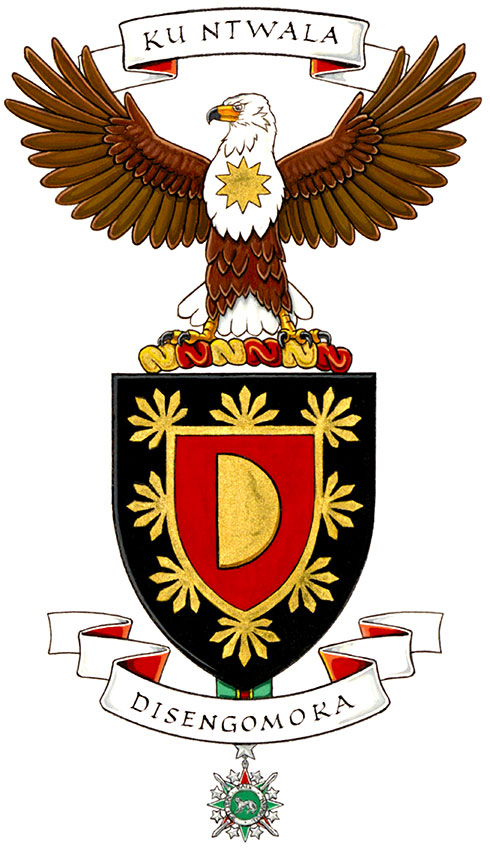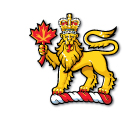- The Governor General of Canada

The contents of this Register are intended for research purposes only. The heraldic emblems found in the Register may not be reproduced in any form or in any media without the written consent of the Canadian Heraldic Authority and/or the recipient.
Assa Disengomoka
San Diego, California, United States of America
Grant of Arms, with differences to Jorim Zola Mabolia Disengomoka, Jeriel Assa Disengomoka and Janida Celia Hart
November 15, 2021
Vol. VIII, p. 38

[ previous page ]
Blazon
Arms
Sable on an escutcheon Gules within a tressure issuant therefrom manioc leaves Or, a bezant couped to the dexter;
Crest
An African fish eagle displayed proper charged on the breast with a mullet of ten points Or;
Motto
KU NTWALA;
Motto
DISENGOMOKA;
Symbolism
Arms
Gold and red represent the rich culture of the country now called the Democratic Republic of Congo, Mr. Disengomoka’s ancestral land. The black background represents bereavement and commemorates all those who have moulded his life but have passed on. The golden half disc alludes to the letter D and thus Mr. Disengomoka’s family name. The shape also alludes to a protractor and to a coin cut in half, symbolizing his expertise in civil engineering as well as his ability to manage large construction projects at low cost. The leaves of manioc—an important item of produce in Africa—stand for Mr. Disengomoka’s spouse’s constant effort to provide nourishment and strength to the family.
Crest
The African fish eagle symbolizes Mr. Disengomoka’s sense of duty toward his family, protecting it and providing leadership for its welfare. The ten-point star symbolizes his two parents and their eight children, including himself.
Motto
Meaning “Toward the future,” this phrase is the title in Kikongo of an important book on morality, which Emile Adolphe Disengomoka, Mr. Disengomoka’s father, translated in 1942.
Motto
Meaning “It will be revealed,” this Kikongo phrase became a family name. Using it as his motto, Mr. Disengomoka expresses his pride in his name, in his family’s history, and in the Congolese tradition of giving names that are meaningful and that define family identity.
